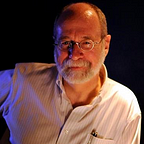Growing up rooting for Bill Russell
I knew this day would come, obviously, but I was hoping somehow it wouldn’t. There are too many thoughts to record on the death of Bill Russell.
. . .
I’m not sure why we were Celtics fans in my house when I was young, living in a suburb of New York City. Maybe because they were the Celtics, sporting a shamrock and led by a leprechaun; we were Irish, after all. Maybe because it was no conflict with also wishing the best for the New York Knicks, who, until their own magical rise at the end of the 1960s, traditionally turned the floor of Madison Square Garden into a giant welcome mat for the Celtics — and most everyone else.
Maybe it was just because those Celtics won, all the time, in the most exciting fashion imaginable: Cousy, Heinsohn, the Joneses, Sam and K.C., and later, Havlicek. Led through it all by Bill Russell and his coach and brother-in-arms, Red Auerbach, to create a sports dynasty like no other. (An aside: We moved to Massachusetts during the Celtics’ reign, and the Knicks later started winning, a disorienting turn of events for me.)
The Celtics won 11 titles in 13 years after Russell arrived, including eight in a row. His acquisition by the Celtics in 1956 is the stuff of legend: To get Russell, they traded their all-star-caliber center and another player to the St. Louis Hawks, who had drafted Russell with the second pick. We then enter the gray area between legend and myth: According to Auerbach, the Celtics ensured the cash-strapped Rochester Royals would pass on Russell with the first pick by offering Ice Capades dates at their arena; the Celtics owner, Walter Brown, was part owner of the Ice Capades. Neither owner ever confirmed the story.
Russell brought a new athleticism, a new verticality, to basketball — which had been floor-bound — with his shot-blocking, rebounding, and leaping ability. (He had been a high-jumper in college.) He combined his otherworldly physical gifts with a new way of thinking about the game, about ways to make his teammates better and to discourage and intimidate opponents.
That made Russell the ultimate champion: In 21 winner-take-all games across his college, Olympic, and professional careers, his teams were 21–0. The 21st may have been the best: game seven of the NBA Finals against the Los Angeles Lakers in the Forum in L.A., balloons suspended in the rafters to be released after the Lakers’ seemingly inevitable victory against an aging Boston team.
All of that would be enough for any sports fan. But with Russell, there was something else: He insisted that the bonds among equals that made his teams great had to extend to life off the court as well. For Russell, his equality, his rights in the larger world were non-negotiable.
He marched with Martin Luther King Jr. He joined NFL great Jim Brown and then-Lew Alcindor (now Kareem Abdul-Jabbar) in support of Muhammad Ali when Ali refused to be inducted into the U.S. Army and was stripped of his boxing title. The passage of time has frozen those events in amber, where we can admire them from a comfortable distance. But they were not popular decisions, and they came with great risks.
For the young sports fan who had been living in a white New York suburb — we were a diverse collection of ethnicities emerging from generations of both subtle and overt discrimination, but, conspicuously, African Americans were not among us — these were a different kind of sports star. Their willingness to engage the ills of the world beyond sports, their unyielding insistence on their equality and dignity as human beings, changed the way some of us saw both sports and the wider world. It changed our view of what constituted greatness in sports.
Russell did all of that: reaching the pinnacle of achievement in sports, demonstrating that those accomplishments were just one part of life, and doing it with an infectious laugh — his unforgettable cackle — that reminded us how big, how joyous, how brave, a life can be.
This originally appeared as the column One Dog Barking in Citizencartwright.com.
